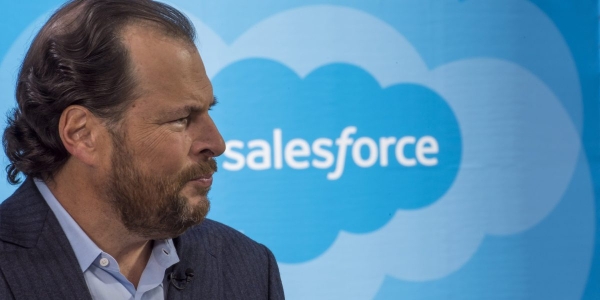
Salesforce-owned Slack is sunsetting Future Forum, a consortium that conducted quarterly surveys of 10,000 office workers globally on flexible and remote work, and repeatedly found it was popular with most workers. Among other things, it found that flexible work has a positive impact on productivity, fosters trust between employees and employers, and decreases employee turnover. This comes amid Salesforce CEO Marc Benioff’s push for workers to return to the office.
On Friday, the executive leader of the Future Forum, Brian Elliot, wrote “there’s no easy way to say this” to employees in Slack’s internal #friends-of-future-forum channel, disclosing that the company planned to shut down the research group at the end of March, according to screenshots of the message seen by Fortune. He did not cite a reason for the closure, and a Slack spokesperson was not immediately available for comment.
“I believe this is what’s best for Slack,” Elliot wrote, adding that the company will continue its investment in research around the future of work, but did not describe details for what lies ahead for the consortium.
At the launch of Future Forum in September 2020, Elliot wrote a blog post that outlined its mission, citing “the sudden move to remote work provides the opportunity to question decades of orthodoxy about a 9-to-5, office-centric, homogeneous work culture.”
The decision to shutter the Future Forum comes after reports that Salesforce is mandating a return to the office for some employees at a manager’s discretion—despite the benefits of flexible work that Future Forum found in its research.
What’s more, Salesforce has executed a litany of cost-cutting measures: 10% of the company was laid off in January, an employee “gratitude” bonus was lowered by 40%, the board’s M&A committee was disbanded, and Benioff told staff he was looking to cut $3 billion to $5 billion in costs.
“The Future Forum team has been critical to crafting our market position and helping companies envision a new, more productive way of working,” newly appointed Slack CEO Lidaine Jones wrote in the channel. “We remain committed to flexible, inclusive work at Slack and will carry forward your impactful work.”
Benioff’s turn against remote work
The changing of hands at Slack—Salesforce acquired it for $28 billion in 2021—has also meant a change in ideals. Slack’s co-founder and CEO of over a decade, Stewart Butterfield, has long advocated for flexible work for all employees, which he believes will be integral to business success going forward. (Butterfield unexpectedly announced in December that he would be leaving Slack.)
“People do want structure, and people like boundaries,” Butterfield told Fortune editor-in-chief Alyson Shontell two months earlier, in October. “But they don’t like to be told what to do, so I think the secret is to not make them feel like their autonomy is being denied or that their ideas aren’t important, while still giving some structure.”
The same can’t be said for Benioff, at least not anymore. Last month, in a document outlining Salesforce’s obstacles, Benioff wrote that “wellness culture overpowered high performance culture” during pandemic-era remote work. And in December 2022, he wrote in the #all-salesforce Slack channel that employees hired during the pandemic had “much lower productivity.” He followed that by soliciting feedback: “Is this a reflection of our office policy? Are our managers not directly addressing productivity with their teams?”
Earlier this month, on the On With Kara Swisher podcast, Benioff said he “knows empirically” that new hires perform better “if they’re in the office, meeting people, being onboarded, being trained.”
“If they are at home and not going through that process, we don’t think they’re as successful,” he said.
It was a big departure for Benioff from just last summer, when he criticized return-to-office mandates in general. They’re “never going to work,” he said at the time.
In a company town hall in January, Butterfield admitted he “wasn’t very successful” in integrating Slack’s culture with that of Salesforce, per an audio recording of the meeting Fortune obtained. “The problem has been, there’s no incorporation of the Slack culture into the Salesforce culture, and unless there is some element of that, then it’s not integration in any sense. It’s just the elimination.”





